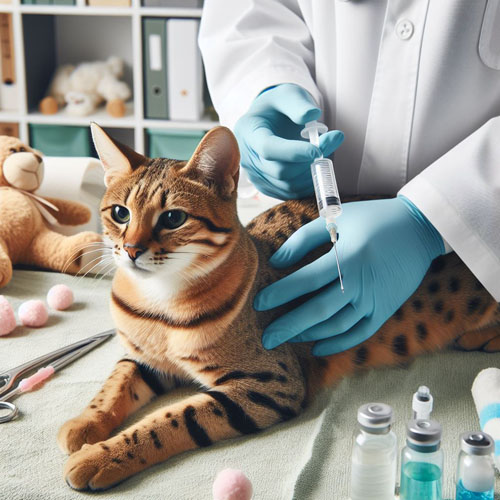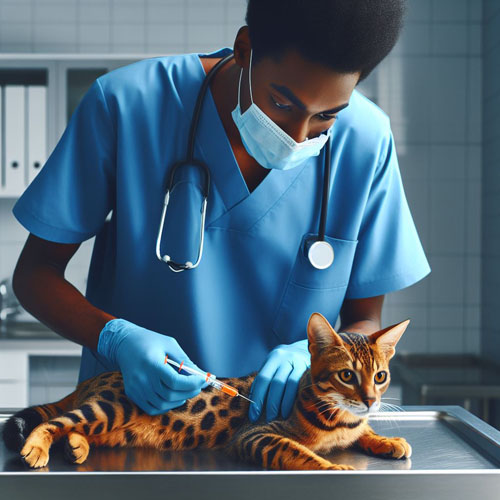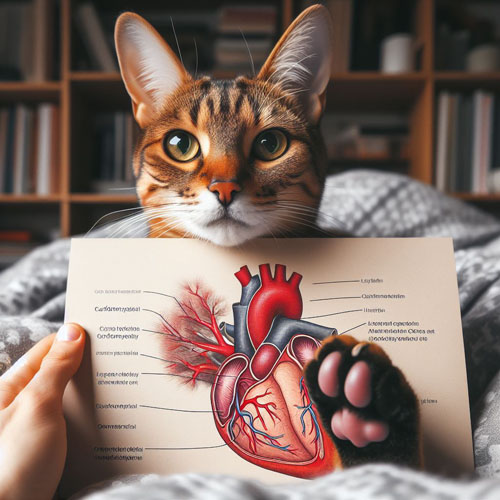Abscesses in Savannah Cats
Understanding Abscesses in Savannah Cats: Causes, Symptoms, Diagnosis, and Treatment
Savannah cats like all pets, are susceptible to various health issues, one of which is abscesses. Abscesses are localized infections that can occur in any part of a cat’s body. In this article, we will delve into the causes, symptoms, diagnosis, and treatment of abscesses in Savannah cats.
Causes of Abscesses in Savannah Cats: Abscesses in Savannah cats can arise from various causes, with the most common being bite wounds. These wounds often occur during rough play, territorial disputes, or fights with other animals. The bacteria present in the mouth of the attacking animal can introduce infection into the bite wound, leading to the formation of an abscess.
Other potential causes of abscesses include foreign bodies, such as thorns or splinters, entering the skin and causing infection. Poor grooming habits or underlying health issues that compromise the immune system can also contribute to the development of abscesses in Savannah cats.
Symptoms Associated with Abscesses: Identifying abscesses in Savannah cats requires careful observation of their behavior and physical condition. Some common symptoms associated with abscesses include:
- Swelling and Redness: Abscesses typically present as swollen and red lumps on the cat’s body. The affected area may be warm to the touch. Some may even appear to look similar to a tumor
- Pain and Discomfort: Cats with abscesses often display signs of pain, such as limping, reluctance to move, or vocalization when the affected area is touched.
- Fever: Systemic signs of infection, including fever, may be present in cats with abscesses. Monitoring your cat’s body temperature can provide valuable information about its overall health
- Decreased Appetite: Cats may experience a loss of appetite when they are unwell. If your Savannah cat is not eating as usual, it could be a sign of an underlying issue such as an abscess
Diagnosis of Abscesses in Savannah Cats: A veterinarian will perform a thorough examination to diagnose abscesses in Savannah cats. The examination may include:
- Physical Examination: The vet will assess the size, location, and characteristics of the abscess. They will also check for signs of systemic illness.
- Aspiration of Fluid: In some cases, the vet may use a needle to aspirate fluid from the abscess for analysis. This helps identify the specific bacteria causing the infection, guiding the choice of appropriate antibiotics.
- Imaging Studies: X-rays or other imaging studies may be conducted to evaluate the extent of the infection and identify any underlying foreign bodies.
Treatment of Abscesses in Savannah Cats: The treatment of abscesses in Savannah cats typically involves a combination of medical and supportive care:
- Drainage of the Abscess: The vet will often need to drain the abscess to remove the accumulated pus and debris. This may be done through a simple incision or by placing a drain to facilitate ongoing drainage.
- Antibiotic Therapy: Once the abscess is drained, antibiotic therapy is initiated to target the specific bacteria causing the infection. The choice of antibiotics is based on the results of the fluid analysis.
- Pain Management: Pain relief medications may be prescribed to ensure the cat is comfortable during the healing process.
- Supportive Care: Provide your Savannah cat with a comfortable and clean environment to aid recovery. Follow any additional recommendations from the veterinarian, such as wound care or special dietary considerations.
Preventing Abscesses in Savannah Cats: While it may be challenging to eliminate all potential risks, there are steps you can take to reduce the likelihood of abscesses in Savannah cats:
- Indoor Living: Keeping your Savannah cat indoors can minimize the chances of encounters with other animals that may lead to fights and bite wounds.
- Regular Veterinary Check-ups: Schedule regular veterinary check-ups to monitor your cat’s overall health and address any underlying issues promptly.
- Prompt Wound Care: If your cat sustains any wounds, clean them promptly and keep a close eye on the area for signs of infection.
Conclusion: Abscesses in Savannah cats can be a concern for pet owners, but with prompt veterinary attention and proper care, most cats can recover successfully. Understanding the causes, symptoms, diagnosis, and treatment options empowers cat owners to be proactive in maintaining their feline companions’ health and well-being. Regular veterinary check-ups and a vigilant approach to your cat’s behavior and physical condition are crucial in ensuring a happy and healthy life for your Savannah cat.





